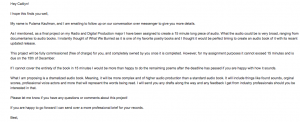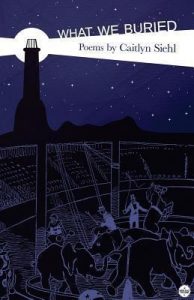Ideas
At first, I intended to take this project in the direction of a classic radio feature or documentary. It is a format I feel very comfortable with and have had some experience producing so it seemed like the natural path. However, after settling on a documentary topic surrounding the Auschwitz memorial in Poland I was met with some road blocks. I did not hear back from possible contributors and the memorial itself did not show much interest. I could have chosen to pursue this further, but since I would have to travel to complete that project, I decided the risk of completing that documentary by the deadline was too great.
I then completely shifted gears to the audiobook category. I was browsing on social media when I noticed that a favorite author of mine had re-published her collection of poetry. She has a prominent following on social media and is an Amazon and Barnes and Noble best seller so I thought it might be a long shot to approach her. In reality, she was very receptive and excited about the idea of turning her poetry into an audio book. Below is some images from the commission process.

![]()
Research
There is a huge gap in the market surrounding audio books of poetry collections. A quick search of the 10 best selling poetry books of the 21st century shows that very few have been made into audio books. And a scan through the audible section of poetry is full of Shakespeare and Maya Angelou, but you will struggle to find a title that has gained fame recently.
Many people find poetry hard to digest and unapproachable. If they had the tool of a dramatized audio book to help illustrate the words, I think this attitude would change.
Caitlyn Seihl wrote her book after she gained a large following on tumblr for poetry writing. She is a great example of a modern poet who gained an audience before even releasing a collection of poetry. Her young audience is a perfect target for an audio book as they are the demographic that spends the most time on smartphones which in turn raises their likelihood to interact with things like podcasts and audiobooks. source

Production
As I mentioned in my brief to Caitlyn, I intend to create a dramatized audio book of her poetry collection entitled, “What We Buried.” I want the audio book to reflect the context in the poems using voice overs, original scores, acted scenes and found sounds. This is much more experimental audio than I am accustomed to producing but my goal is to make the listener feel how the author felt when she wrote the poem through the use of sounds.
Some examples I have used for reference are:
- Nina Perry composed features: https://www.ninaperry.co.uk/composed-features
These features demonstrate a great use of music as a way to command a certain tone and feeling within a piece. The music here is also used to create natural breaks in speech that add depth.
- Audible. Call Me By Your Name: https://www.audible.co.uk/pd/Call-Me-by-Your-Name-Audiobook/B071YHXZYN
This audiobook is read by one of the actors in the film adaptation of this book but I think it is a good example of the tone I want my audio book read in.
- Clair De Lune https://www.youtube.com/watch?v=WNcsUNKlAKw
Clair De Lune is an example of how I want my original score to sound.
Next actions in production;
-
- Find voice over artist(s)
- Decide on tone
- Record poems
- Break up poems into 3 separate sections and styles
- Create score
- Script actors
- Find audio
- Record audio
After I have collected and recorded all of the initial necessary audio I will begin editing in Audition. I intend to begin editing on November 12th in order to give myself a month to polish the finished piece as best as possible.